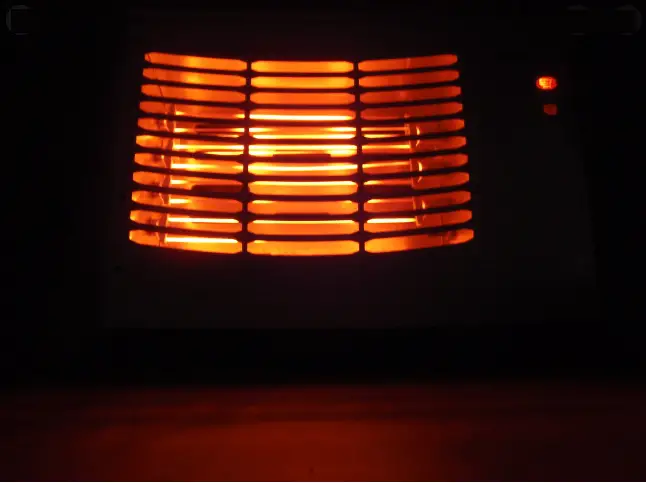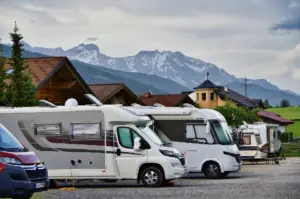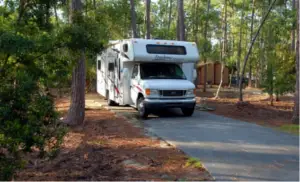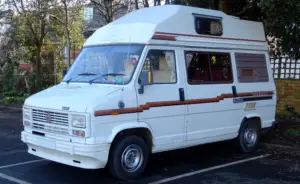When RVing into colder climates, you want to be certain that you’re not going to spend the entire vacation shivering and rubbing your hands together over a bonfire to get feeling back into your fingertips. RV Furnace is important if you are going RVing in winter.
It’s imperative to have both heating and cooling inside your RV unless your plan is to sleep in a tent upon arrival and your RV is simply a means to get from point A to point B.
However, if you want to camp and vacation comfortably, you’ll need your RV furnace and AC to be in working order, and adequately powered so you can actually run the furnace as you camp.
Watts consumption and Amps drawn by RV Furnace
The typical amp pull by an RV furnace is 6.5 amps. However, the RV typical AC amp pull is 12-15 amps at the start, then 3-6 amps while running.
These numbers alone don’t pose any problem The typical RV is usually designed with a 30 amp or 50 amp, 220 VAC service.
RV furnaces normally consume lesser than 1000 watts and in some cases it can be higher upto 1500 watts as well.
Its upto you how big furnace you need which in turn will depend on how much area of the RV you want to heat. Higher the watts, higher is its capacity.
RV heaters will utilize same number of watts for both running and starting unlike other appliances like air conditioners.
You should be able to run the RV furnace using batteries alone. You will not need generator and batteries should do it as long as it is in good shape. Talking about generators, you can be fine with a Honda 1000 or 2000 watts to charge the batteries later.
Read : Watts consumed by rv air conditioner
Do RV Furnaces Run Without Electricity
Most of the current camper furnaces are propane, but they will not run without an electrical hookup.
Although the propane heats the air, the igniter switch on the furnace and the blower are both run on electricity, and without electrical power, your furnace will not even kick on.
You have the option of using solar power to run your appliances and devices inside your RV, but propane alone will not run your RV furnace because of the electrically powered components in your furnace.
Can You Convert A Gas RV Furnace To An Electric Furnace
No, you cannot convert a gas furnace to an electric furnace. The cost of such a conversion isn’t a sound fiscal decision.
Also, the parts necessary for the conversion would need to be custom fabricated because that type of conversion isn’t taking place.
Propane Vs. Electric RV Furnaces
| Propane Furnace | Electric Furnace | |
| Pros | Propane is simple to use. Easy to operate and adjust. | Operate at peak efficiency. Don’t waste energy. Localized heating Possible. |
| Cons | Localized temperature changes is difficult. Operate at maximum of 70% efficiency. | Higher costs. |
Can I Operate My RV Furnace On Battery Power
Absolutely, your furnace will run just fine on battery power, in addition to propane if it is a propane furnace.
If you do not have propane, though, your camper furnace will not run on the battery power alone. However, if you have an electric RV heater, it will run on battery power alone until the battery is dead.
The standard RV battery holds around 80 amp hours when charged. Typically, the usable power will be around 50% of the batteries rated capacity.
Keep in mind, if your 12-volt batteries drop below a certain threshold of stored charge, the AC/DC converter will kick in and add even more current load to your 110 VAC as it charges your batteries back up. Your RV battery will push your furnace necessary amps without a problem.
How Long Will A Furnace Run On The RV Battery
In short, the electric components of your RV Furnace will run off of your RV battery until the battery dies.
If you are running a fully electric RV furnace off of your RV battery, and the electric furnace is the only appliance running off of your charged battery, you should have about 12 hours before your battery is fully drained.
How Long Will An RV Heater Run On Propane
This matters entirely on the size of the propane tank that is connected to your RV. Typically, if you run a propane RV furnace for one hour, you will use about ⅓ gallon of propane.
However, remember that it is the propane that produces the heat, but you will still need the furnace to be connected to electricity in order to run the blower and igniter on the furnace.
This means that even a propane heater will not run on solely propane. You will need propane and a source of electricity in order to run your furnace.
How Much Propane Is Needed In An RV
This can vary greatly depending on the number of appliances that you are powering with propane in your RV.
Typically, one hour of using a propane-powered furnace will use ⅓ gallon of propane. However, in an RV, your refrigerator and water heater are also more than likely being powered by propane as well.
In addition, in some older RV’s, there isn’t a propane hook up directly to the RV. So, having a propane-powered generator means you can fuel the it with the propane. Hook it to the RV, then draw the electricity from the propane fed generator into the camper electrical feed.
Read : What size generator for RV
- You will probably want to run the water heater and fridge on propane instead of your RV batteries or generator because they’re both a very heavy draw on batteries and your generator.
- Unless you have solar panels to recharge your batteries and generator, it will be quickly consuming your electricity to run appliances like the water heater and fridge on the batteries and generator.
- Another tip to using the propane in your RV is to only run propane from one tank at a time, even if you have a two-tank setup on your RV.
- This is because when you have multiple propane tanks set up, it draws the propane out of both tanks at one time equally. Instead of being able to go switch to another tank on a cold morning, you’ll have two nearly empty tanks that you cannot draw propane from.
Read : Do RV Refrigerators run on propane?
How Efficient Are camper Furnaces
Depending on the age of the RV furnace and the fuel that runs the furnace, it could be a vast difference in efficiency.
Propane is quieter when operating, burns clean, and has a long shelf life, but propane furnaces only operate at 70% efficiency at best.
- A propane furnace will waste a great deal of propane while you are operating the furnace.
- However, electric V furnaces operate at peak efficiency and they can also heat a specific area. A propane RV furnace cannot be used to heat one certain location or area of your RV as an electric furnace can.
- There are a few aftermarket RV furnaces that run on electricity that you could install to heat your RV.
One of the aftermarket RV heater is a wall cube heater. It fits into a niche cut out into the wall, and you can install multiple vents for the cube heater to push hot air through. The ability to run it through the vents makes it similar to using the ducted RV heating system that came installed in your RV.
Another option is an infrared or radiant electric heater. These heaters glow red and emit an infrared heat that you can easily direct to a specific person or area of the RV.
The radiant electric heater emits infrared heat at 1500 watts output. The infrared heater units are a little less popular because since they typically don’t fit into a wall niche, there is a chance that they could tip over while the RV is in motion, and then they become a fire hazard.
Increasing RV Furnace Efficiency
It seems quite silly that the standard propane-fueled RV furnace that most people have needs to have both propane and electricity in order to provide any heat.
What would be much easier is to remove the propane RV furnace and install a wall cube heater in your RV?
The ability to run the heat through multiple vents makes it a great heating system for an RV and helps it to heat your whole RV.
1. Use Gasoline Powered Generator
A gasoline-powered generator to run an electric RV furnace would be a good way to handle this situation.
Gasoline is easy to find and purchase and is much more efficient than propane. Yet, as with all items you take upon yourself to complete, it can be dangerous to operate a gas-powered generator because of the extreme flammability.
Isn’t Clean : Another thing you need to remember is that gasoline doesn’t burn clean like propane burns, and you can become incredibly sick or even die from the fumes that a gasoline-powered generator emits.
Don’t ever operate a gasoline-powered generator inside of your RV, as the build-up of emissions can quickly overpower you.
2. Use Solar Panel
When you introduce solar panels to your RV, you are minimizing the need to either operate your generator to power your RV and charge your RV batteries, or to use another source of energy to do the same.
Solar energy, unlike your gasoline-powered generator, is both a clean collection and clean to use to power your RV, so there are no flammable fluids or hazardous fumes involved in operating the appliances in your RV.
3. RV battery changes than can work
Another possibility is to bank your RV batteries. To bank your batteries, you take batteries of the same amp rating and voltage, and you connect them to one another using jump wire. This adds extra voltage to your battery system while leaving the amperage the same.
Get Lithium Batteries : You can also improve efficiency in the battery system in your RV by swapping your batteries over to lithium batteries.
Lithium batteries are essentially self-managing and self-maintained. You may also want to consider the installation of a second alternator on your RV. One alternator needs to run the coach and chassis electrical systems, and the other alternator needs to be used solely to power the RV engine and components and nothing else.
This would ensure that the two electrical systems are completely separate from one another, and it helps to keep the strain of running all of the appliances and RV lighting off of the battery and alternator that ensure your RV will be driveable.
4. Do not Use Propane While driving
One important factor to keep in mind is that you should never use any propane to operate anything in or on your RV while the RV is in motion.
When you are driving the RV, no matter how far of a distance you’re going, the propane canisters need to be stored somewhere on the exterior of the RV, safely contained in their storage area and secured into place.
If you suspect that you may have a leak on any of your propane equipment or cylinders, do not attempt to use anything propane operated and do not turn on any appliance at all inside of the RV until the leak has been isolated and contained.
5. Check and fix propane leaks
You can check for leaks on the propane connections and lines by running soapy water over the lines and connections. If it starts to blow bubbles out of the soapy water, you indeed have a leak that is allowing propane to escape into the RV.
Read : Fixing a RV furnace that isn’t igniting
In Conclusion :
Having a furnace inside RV will keep it warm during cool winter nights. RV furnaces work similar to home furnaces and mostly run on propane. A question that many have about whether they can run it without electricity? Propane furnaces do need some electricity.
One can also go for electricity space heaters which wont need propane.





